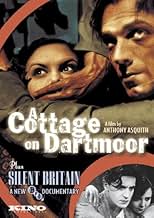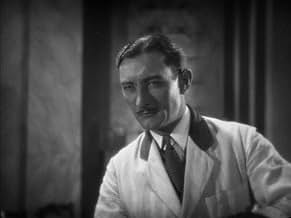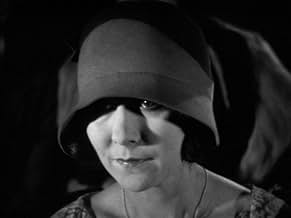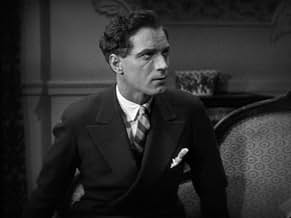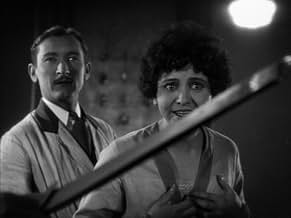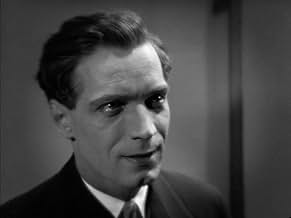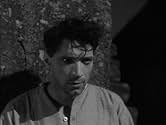NOTE IMDb
7,5/10
1,3 k
MA NOTE
Ajouter une intrigue dans votre langueA former barber escapes from a high security prison. Flashback story of an escape from the lonely, high-security Dartmoor Prison.A former barber escapes from a high security prison. Flashback story of an escape from the lonely, high-security Dartmoor Prison.A former barber escapes from a high security prison. Flashback story of an escape from the lonely, high-security Dartmoor Prison.
- Réalisation
- Scénario
- Casting principal
Hans Adalbert Schlettow
- Harry - a Dartmoor Farmer
- (as Hans Schlettow)
Anthony Asquith
- Bespectacled Man in Cinema
- (non crédité)
Judd Green
- Customer
- (non crédité)
Avis à la une
I'm extremely impressed with every aspect of 'A Cottage on Dartmoor', directed by the underrated Anthony Asquith (son of the Prime Minister). The camera-work features some superb tracking shots, kept perfectly in focus by focus-puller Arthur Woods (later a brilliant director in his own right, all too briefly before his death in World War Two). There is a clever and subtle flashback transition. The frame compositions are excellent, as are the performances by this obscure cast. At the climax of this monochrome film, there is a single flash of red: Hitchcock would later use this same device in 'Spellbound'. I wonder if Hitchcock copied it from Asquith.
Most of this story takes place in flashback, a device which I normally dislike. Flashbacks are now so hackneyed that there is an entire cinematic grammar of flashbacks: the screen goes blurry, the soundtrack swells with theremin music. Here, the transition to flashback is done subtly, with the first dialogue intertitle bridging the shift. Well done!
Some minor details distressed me. We see a prisoner who escaped from Dartmoor. His uniform displays a number, but shouldn't it also have the broad arrow? Also, since Joe (the convict) has sworn revenge against Harry Stevens -- his rival for the affection of Sally -- why ever have Harry and Sally moved to a remote cottage on Dartmoor, conveniently close to Joe's prison? This is the sort of thing which Hitchcock identified as 'icebox logic', the cinematic equivalent of "esprit d'escalier".
This film was made at an awkward moment of cinema history. The movie is silent, yet (in the dialogue titles) the characters on screen discuss going to 'a talkie'. But when they go to the cinema, a live orchestra are playing ... which indicates that the movie being shown is a silent. And an insert shot of a programme book tells us that the movie is Harold Lloyd's 'Safety Last', definitely a silent.
Not the least of this film's pleasures is its depiction of life in George V's England. I got a twinge of nostalgia from a brief shot of an infant clutching a rusk. (Do modern babies eat rusks?) In the central role, Norah Baring is excellent: portraying a simple manicurist, she is personable and pleasant to look at, without the implausible amount of glamour that a Hollywood actress would have brought to such a workaday role. I'll rate this fine character drama 8 out of 10.
Most of this story takes place in flashback, a device which I normally dislike. Flashbacks are now so hackneyed that there is an entire cinematic grammar of flashbacks: the screen goes blurry, the soundtrack swells with theremin music. Here, the transition to flashback is done subtly, with the first dialogue intertitle bridging the shift. Well done!
Some minor details distressed me. We see a prisoner who escaped from Dartmoor. His uniform displays a number, but shouldn't it also have the broad arrow? Also, since Joe (the convict) has sworn revenge against Harry Stevens -- his rival for the affection of Sally -- why ever have Harry and Sally moved to a remote cottage on Dartmoor, conveniently close to Joe's prison? This is the sort of thing which Hitchcock identified as 'icebox logic', the cinematic equivalent of "esprit d'escalier".
This film was made at an awkward moment of cinema history. The movie is silent, yet (in the dialogue titles) the characters on screen discuss going to 'a talkie'. But when they go to the cinema, a live orchestra are playing ... which indicates that the movie being shown is a silent. And an insert shot of a programme book tells us that the movie is Harold Lloyd's 'Safety Last', definitely a silent.
Not the least of this film's pleasures is its depiction of life in George V's England. I got a twinge of nostalgia from a brief shot of an infant clutching a rusk. (Do modern babies eat rusks?) In the central role, Norah Baring is excellent: portraying a simple manicurist, she is personable and pleasant to look at, without the implausible amount of glamour that a Hollywood actress would have brought to such a workaday role. I'll rate this fine character drama 8 out of 10.
Sally lives in a cottage on Dartmoor when, on a dark and quiet night, a man breaks into her home having just escaped the high-security prison across the moors. That man is none other than Joe, a former barber's assistant at the place where Sally used to be a manicurist. As they connect eyes, the audience flashback to the times where Joe and Sally once worked together and he had tried to woo her at the beginning of a series of events that now brought them to this place.
The BBC's summer of British films this year turned out to be better than I expected it to be because, instead of wheeling out Zulu, Dam Busters and all the usual British films, they actually screened lots of films that I had not seen or, in some cases, heard of. Of course this meant that some of them were not any good but at least it was an attempt to fresh up the idea of what British cinema is. A Cottage on Dartmoor is a good example of this as it is rare for silent films to be screened on television and far more rare for them to be British silent films. I had never seen this and I enjoyed it a great deal.
Narrative-wise the film opens with an element of fear and tension before jumping back to more of a comedy and romance. As this builds back to where it started again for a good finish. The film is maybe 15 minutes too long for the material to sustain but otherwise it is well delivered. The funny bits are amusing, the tense bits tense and the romance nicely melodramatic and tragic, however it is the delivery that makes the film specifically that of Asquith and his cinematographer. Visually the film matches the tone of the film really well opening and closing with sharp shadows on the moors, and enjoying a bright and carefree air early in the barbershop scenes. The images are sharp and really well formed with plenty of clever shots. Mirrors are used well, conversations represented by stock footage, flashbacks delivered within flashbacks and a great scene where we watch a cinema audience reacting to a film they are watching. Visually and technically it is very impressive and I enjoyed it a great deal.
Deserves to be screened a lot more than it is and be seen by more people than it is, but credit to the BBC for showing it recently.
The BBC's summer of British films this year turned out to be better than I expected it to be because, instead of wheeling out Zulu, Dam Busters and all the usual British films, they actually screened lots of films that I had not seen or, in some cases, heard of. Of course this meant that some of them were not any good but at least it was an attempt to fresh up the idea of what British cinema is. A Cottage on Dartmoor is a good example of this as it is rare for silent films to be screened on television and far more rare for them to be British silent films. I had never seen this and I enjoyed it a great deal.
Narrative-wise the film opens with an element of fear and tension before jumping back to more of a comedy and romance. As this builds back to where it started again for a good finish. The film is maybe 15 minutes too long for the material to sustain but otherwise it is well delivered. The funny bits are amusing, the tense bits tense and the romance nicely melodramatic and tragic, however it is the delivery that makes the film specifically that of Asquith and his cinematographer. Visually the film matches the tone of the film really well opening and closing with sharp shadows on the moors, and enjoying a bright and carefree air early in the barbershop scenes. The images are sharp and really well formed with plenty of clever shots. Mirrors are used well, conversations represented by stock footage, flashbacks delivered within flashbacks and a great scene where we watch a cinema audience reacting to a film they are watching. Visually and technically it is very impressive and I enjoyed it a great deal.
Deserves to be screened a lot more than it is and be seen by more people than it is, but credit to the BBC for showing it recently.
COTTAGE ON DARTMOOR: an expressionistic and claustrophobic account of sexual obsession and jealousy, very Hitchockian in the way it deals with the resulting crescendo of suspense, especially in connection with a key throat-cutting in a barber's chair incident. Asquith was a director who grew stodgy as his career entered into the sound era, viz his terribly British adaptions of Rattigan, but the present film (1929) is rather an eye opener. One standout scene is set within a cinema, partly a comment on the imminent and creatively burdensome coming of clunky sound, and which contains an extended eye opening use of editing, cutting about within an audience as the beady-eyed boy friend watches his victims - a bravura sequence which ought to be much better known to cineastes.
First time of viewing this one: a marvellous experience, from the opening shots of a prisoner on the run over moorland from prison guards to the ending where
The first intertitle is "Joe!" and we're immediately launched into an hour long flashback of how Joe got to be a prisoner and how he knows Sally. He's obsessively in love with her with awful consequences for the man she really loves, and himself - realistically portrayed and apart from the incident in the barbers unfortunately only too believable. The three main leads play their parts wonderfully well with incessant close ups, inventive photography, low cameras and precise mirror shots highlighting the intensity. Photogenic Norah Baring thankfully was no Hollywood Queen, her self possession and simple youthful homeliness adding an extra dimension to the time honoured tale. Favourite bits: Life in Sally's boarding house with the old biddies, ear trumpets and ancient furniture and plants; The cinema segment with everyone including the redundant pit orchestra intently watching a talkie, and of course the orgasmic psycho-jazz snappy editing; The "murder" in the barbers (it was fun watching everybody apparently just watching the dying man dying).
One of the last mainstream silent films produced, it just couldn't have worked even one year later as a slave to the voice this shows exactly what silent films could offer as an artform, and still do to those with a little patience. Try it.
The first intertitle is "Joe!" and we're immediately launched into an hour long flashback of how Joe got to be a prisoner and how he knows Sally. He's obsessively in love with her with awful consequences for the man she really loves, and himself - realistically portrayed and apart from the incident in the barbers unfortunately only too believable. The three main leads play their parts wonderfully well with incessant close ups, inventive photography, low cameras and precise mirror shots highlighting the intensity. Photogenic Norah Baring thankfully was no Hollywood Queen, her self possession and simple youthful homeliness adding an extra dimension to the time honoured tale. Favourite bits: Life in Sally's boarding house with the old biddies, ear trumpets and ancient furniture and plants; The cinema segment with everyone including the redundant pit orchestra intently watching a talkie, and of course the orgasmic psycho-jazz snappy editing; The "murder" in the barbers (it was fun watching everybody apparently just watching the dying man dying).
One of the last mainstream silent films produced, it just couldn't have worked even one year later as a slave to the voice this shows exactly what silent films could offer as an artform, and still do to those with a little patience. Try it.
Anthony Asquith is best known for straightforward film-making in the so-called British literary tradition which served him particularly well in stage-to-screen adaptations of G. B. Shaw & Terrence Rattigan. Letting the writer function as auteur doesn't win you critical kudos, but films as fine as PYGMALION/'38 and THE BROWNING VERSION/'51 don't just 'happen.' Even so, it's fun to watch the young Asquith show off, even needlessly, on late silents like this & UNDERGROUND/'28, also out on DVD. You can all but hear him parsing the latest Russian or German import just screened at his CineClub. There's some strikingly fast montage work and psychological P.O.V. stuff (even a shock-flash of red tinting as in the original prints of Hitchcock's SPELLBOUND/'45), but the main influence is UFA studios with their posh camera moves, rich visual texture, expressionist acting, shadowy lighting & diagonal slashes The opening works best as Swedish actor Uno Henning (in his only British role, he's an intriguing mix of Buster Keaton & Conrad Veidt) breaks out of prison in search of revenge. The story flashes back to detail a rather commonplace love triangle that gives Asquith plenty of space for his set pieces (a visit to the cinema, a very close shave, et al.) which tend to run on a bit too long. But no matter, it's all ravishing to watch and if the characterizations never quite add up, the visual touches are worth the stretch.
Le saviez-vous
- GaffesJoe's coworker reaches down to pick up the movie tickets with his right hand, but the close-up shows his left hand grabbing them.
- ConnexionsFeatured in Loin de Hollywood - L'art européen du cinéma muet (1995)
Meilleurs choix
Connectez-vous pour évaluer et suivre la liste de favoris afin de recevoir des recommandations personnalisées
Détails
- Durée
- 1h 28min(88 min)
- Couleur
- Mixage
- Rapport de forme
- 1.20 : 1
Contribuer à cette page
Suggérer une modification ou ajouter du contenu manquant

